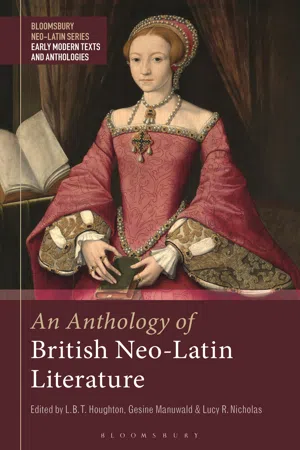
An Anthology of British Neo-Latin Literature
- 312 pages
- English
- ePUB (mobile friendly)
- Available on iOS & Android
An Anthology of British Neo-Latin Literature
About This Book
This volume offers a wide range of sample passages from literature written in Latin in the British Isles during the period from about 1500 to 1800. It includes a general introduction to and bibliography to the Latin literature of these centuries, as well as Latin texts with English translations, introductions and notes. These texts present a rich panorama of the different literary genres, styles and themes flourishing at the time, illustrating the role of Latin texts in the development of literary genres, the diversity of authors writing in Latin in early modern Britain, and the importance of Latin in contemporary political, religious and scientific debates. The collection, which includes both texts by well-known authors (such as John Milton, Thomas More and George Buchanan) and previously unpublished items, can be used as a point of entry for students at school and university level, but will also be of interest to specialists in a number of academic disciplines.
Frequently asked questions
Information
1
Utopia: Elsewhere and Nowhere
Thomas More (1478–1535), Extracts from Utopia
Introduction
Bibliography
Table of contents
- Cover
- Half-Title Page
- Dedication
- Series
- Title Page
- Contents
- List of Illustrations
- List of Contributors
- Preface
- Introduction
- 1 Utopia: Elsewhere and Nowhere: Thomas More (1478–1535), Extracts from Utopia
- 2 An Early Tudor Antiquarian at Bath: John Leland (c. 1503–1552), De thermis Britannicis
- 3 The Nature of the Universe: George Buchanan (1506–1582), De sphaera 1.1–51
- 4 A Celebration of Queen Elizabeth I’s Coronation in Verse: Walter Haddon (1515–1572), In … Elisabethae regimen
- 5 The Latin University Orations of Queen Elizabeth I: Queen Elizabeth I (1533–1603), Speeches of 1566 and 1592
- 6 Female Funerary Verse: Elizabeth Cooke Hoby Russell (1540–1609), Epitaphic Poems
- 7 On Writing about Britain: William Camden (1551–1623), Prefatory Letter to Britannia
- 8 A Birthday Poem for Christ: Adam King (c. 1560–1620), Genethliacon Iesu Christi (c. 1586)
- 9 On Poetry, Politics and Religion: John Owen (1560?–1622), Selection of Epigrams
- 10 A Comic Exorcism: George Ruggle (1575– c. 1622), Ignoramus IV 11 (Excerpt)
- 11 ‘Dazel’d Thus with Height of Place’: An English Lyric in Two Latin Versions: English: Henry Wotton (1568–1639); Latin: Anonymous [Georg Weckherlin (1584–1653)?]
- 12 A Meeting in Mauritania: John Barclay (1582–1621), Argenis, Book 5, Chapter 8 (9)
- 13 The Gunpowder Plot: John Milton (1608–1674), In Quintum Novembris
- 14 A Frost Fair on the Thames: William Baker, Descriptio Brumae, et intensissimi Ianuario mense frigoris, quo Thamesis omnino congelata fuit (1634/5)
- 15 The Beauty and Horror of the Mountains: Thomas Burnet (c. 1635–1715), Telluris theoria sacra 1.1.9 (pp. 66–8)
- 16 A Satire on the Bishop of Salisbury: Anonymous (Thomas Brown?), In Episcopum Quendam (c. 1689)
- 17 A View of the Scottish Highlands: James Philp (1656/7–c. 1713), Grameid 3.10–36
- 18 Thomas Gray Prophesies Space Travel: Thomas Gray (1716–1771), Luna habitabilis 51–72, 78–95
- Index of Names
- Copyright